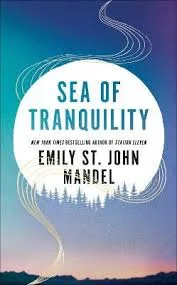…as a species, we have a desire to believe that we’re living at the climax of the story. It’s a kind of narcissism. We want to believe that we’re uniquely important, that we’re living at the end of history, that now, after all those millennia of false alarms, now is finally the worst that it’s ever been, that finally we have reached the end of the world.
Emily Mandel St John’s Station Eleven was one of my favourite books of 2014. Given what happened to us all in 2020, it now seems eerily prescient; the premise of the novel is a pandemic, the “Georgia Flu” which sweeps over the planet with devastating speed and kills most of the population. With what seems to be St John’s trademark style, the novel loops around in time and place and between characters. The pandemic sections are harrowing; her vision of the future is not as terrifying as that of Cormac Mcarthy in The Road, but it’s scary enough. Her 2020 novel, The Glass Hotel, was more realistic, following a woman and her conman husband as his Ponzi-style scam slowly crashes and burns, eventually unleashing a whirlwind of damage and tragedy.
 In St John’s latest book Sea of Tranquility, we are back to the future, by way of the past.
In St John’s latest book Sea of Tranquility, we are back to the future, by way of the past.
It’s 1912. Young English ‘Remittance man’ Edwin St Andrew is a bit of a lost soul, idly travelling around British Columbia, when he has a strange, other-worldly experience in the rainforest which makes him doubt his sanity.
Then the reader is in 2020, revisiting Mirella and Vincent, characters from The Glass Hotel. Next, we move to 2203, when there are colonies on the moon, a radically reconfigured geo-political landscape and a famous writer called Olive Llewellyn is on ‘The Last Book Tour on Earth’ as yet another new pandemic takes hold. When she returns to her home on the moon, it’s into lockdown. Then, 2401, the population lives in giant domes and a detective called Gaspery-Jaques Roberts is hired to investigate a ‘time anomaly’ – which involves Edwin, Mirella, Vincent and Olive.
Though it sounds like sci-fi or speculative fiction – and in a sense I suppose it is – it’s not weighed down with tech. It’s the people I cared about. I loved the way Mandel anchored their strange and futuristic situations in life as we know it, now and in the past.
It’s shocking to wake up in one world and find yourself in another by nightfall but the situation isn’t actually all that unusual. You wake up married, then your spouse dies over the course of the day; you wake up in peacetime and by noon your country is at war; you wake in ignorance and by evening it’s clear that a pandemic is already here. You wake on a book tour with several days left to go, and by evening you’re racing towards home, your suitcase abandoned in a hotel room.
I also loved her beautiful prose. Sentence by sentence, Mandel’s writing is lovely.
What it was like to leave the Earth:
A rapid ascent over the blue-green world, and then the world was blotted out all at once by clouds. The atmosphere turned thin and blue, the blue shaded into indigo, and then – it was like slipping through the skin of a bubble – there was black space.
I am not going to give away any spoilers about the plot – the ‘time anomaly’ – the weird event that so spooked the young Englishman in 1912 and reverberated through the centuries. The plot was puzzling, and fun and thought-provoking, but what I was left with was a kind of gentle wisdom. Life can be tranquil in the face of death. No star burns forever. Somewhere, for someone, the world is always ending.
